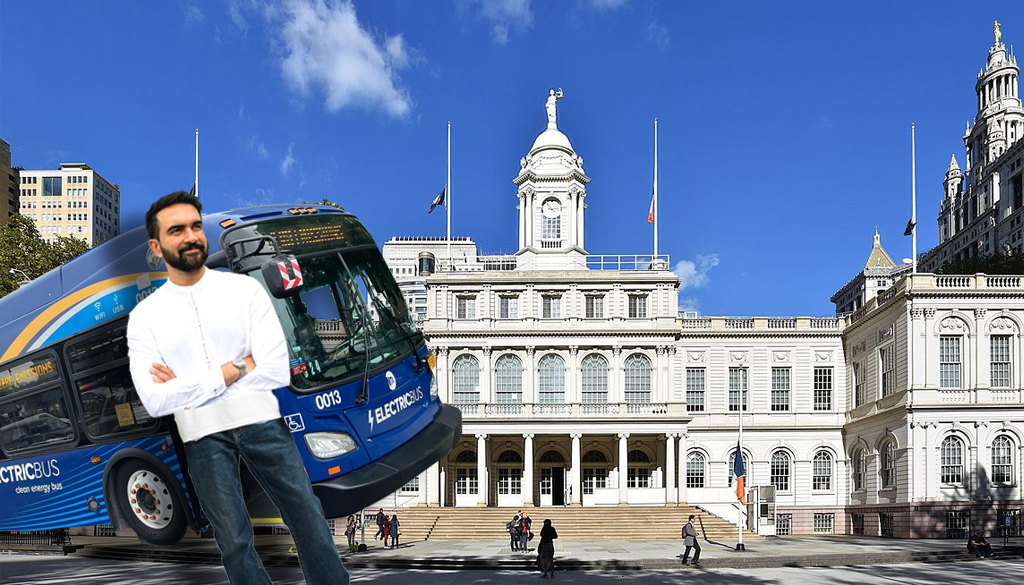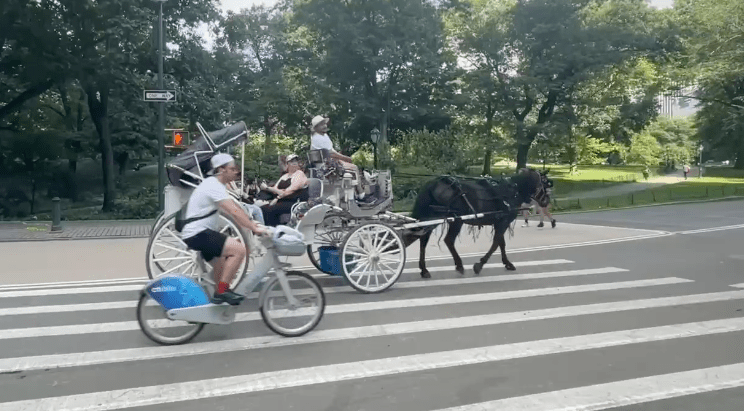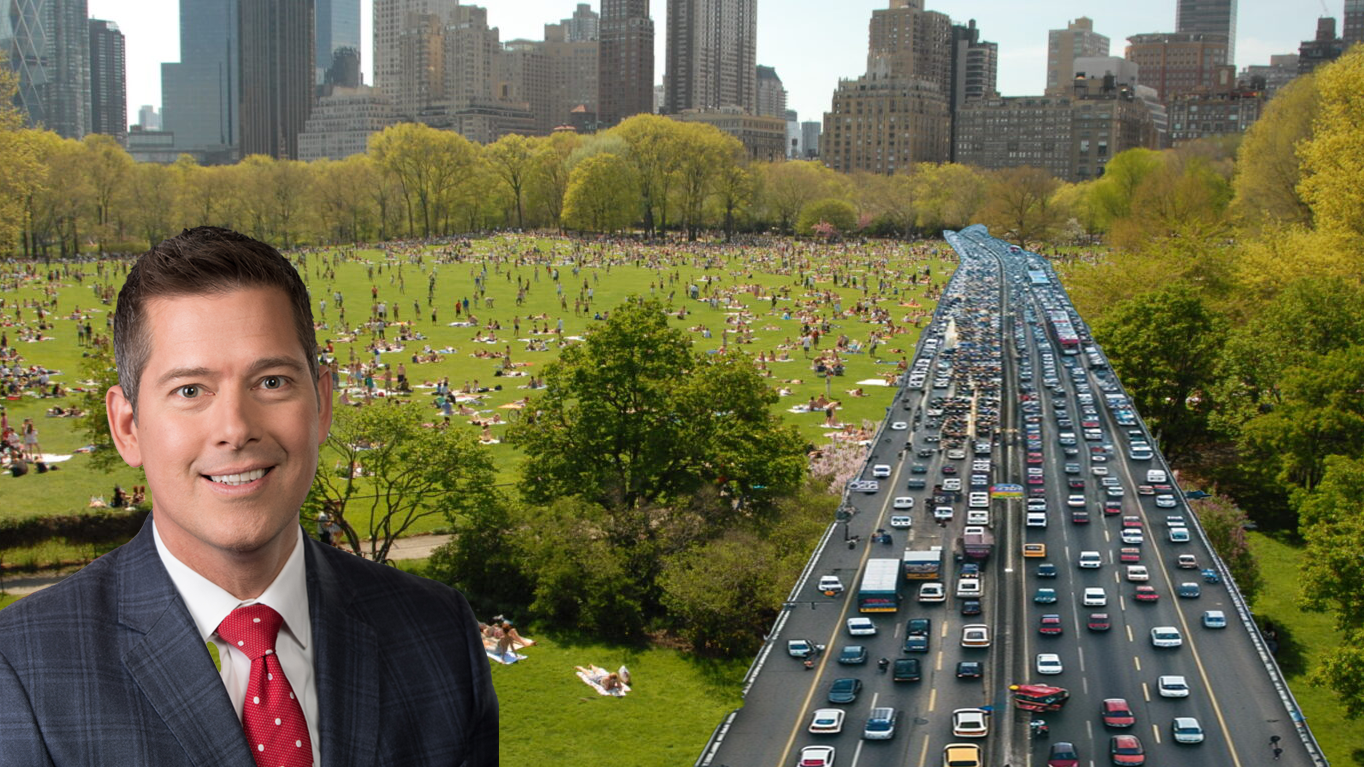
More parking, more problems: A garage proposed for 38th Street would disgorge even more cars onto the intersection of 37th and Ninth during peak hours.
If there's one thing a neighborhood overrun by traffic doesn't need, it's more public parking garages. But that's exactly what New Yorkers who live by the mouth of the Lincoln Tunnel will get if the City Planning Commission allows current development patterns to continue.
Case in point: In January, the developer Glenwood Management requested permission to build a 400-car parking garage attached to a new residential property in Hell's Kitchen. The application -- for 310-328 West 38th Street -- is the latest in a string of special permit requests to build parking in the area. It is currently pending before the City Planning Commission, which is scheduled to render a decision on June 6th. If the commission turns down the application, it could signal an important shift in the ongoing redevelopment of Hell’s Kitchen, which has seen a wave of new construction since a 2005 rezoning took effect.
The last time Streetsblog looked at the parking situation in Hell's Kitchen, local activists were fighting a provision in the new zoning that enabled substantially greater quantities of accessory parking -- spaces intended for building residents or commercial tenants. That battle is still playing out in court. The recent rash of permit requests represents another front in the effort to keep cars from overwhelming the neighborhood's streets.
A number of new buildings include plans for parking that exceed the amount allowed for residents. Glenwood Management, for instance, is only permitted to build 232 spaces for residents -- 114 under the pre-2005 zoning, according to local activists. The additional spaces will then be used by the developer as a public garage. At issue throughout Hell's Kitchen, in essence, is whether the city will allow developers to include public parking garages in new buildings without restriction.
"These regulations were put in place in 1973, more than a generation ago, and I don't think City Planning has ever denied any of those [requests]," says Christine Berthet of the Clinton/Hell's Kitchen Pedestrian Safety Coalition (CHEKPEDS). "As long as each public garage meets the guidelines, they approve it." What gets left out of the discussion is the total effect of those garages on traffic and air quality, she notes. "They never look at it as an aggregate."
In the case of Hell's Kitchen, that aggregate is poised to grow at a rapid clip. Already this year, developers have proposed building garages in the neighborhood totaling more than 500 parking spaces, Berthet estimates. With hundreds of new buildings planned on the West Side, she believes the trend will spiral out of control if left unchecked.
The effect on local streets could be considerable, in terms of both traffic generation and the pedestrian environment. "The Department of City Planning doesn't seem to take seriously the fact that parking generates traffic," says Nick Peterson, a vice president at planning firm Alex Garvin & Associates, "but if a new garage opens on a block that provides a net increase of 200 parking spaces, that's 200 cars that weren't there before. It's pretty obvious that new cars are on the road as a result." As for the pedestrian environment, he adds, "A parking garage is a dead space along the sidewalk -- there is no reason to go in and out of a parking garage except to park or pick up your car."
Traffic heads west on 37th Street towards the Lincoln Tunnel.
The garages in Hell’s Kitchen will be especially tempting to commuters exiting the Lincoln Tunnel. The neighborhood is already one of the most congested in the city and suffers the third highest asthma hospitalization rate among Manhattan's twelve community board districts. New parking facilities will only compound the problem by inducing more commuter traffic.
That is not the intent of the planning commission, which considers traffic volumes as well as demand for parking when it grants developers' requests, but observers say induced commuter driving will undoubtedly result. "There is often this disconnect between the planned condition and reality," says Peterson. "When you walk down a street and see a parking garage in a residential building, does the sign say, ‘Parking for Residents Only’? No. It says, simply, ‘Parking’ or ‘Public Parking.’"
When reached for comment, a Department of City Planning spokesperson referred to a commission report (PDF) on a recent parking application, which states that new garages are needed to offset the loss of parking incurred by new development, and to accommodate the influx of new residents.
Berthet takes issue with this stance because it assumes that existing parking lots were intended to serve as parking in perpetuity. In fact, she notes, the lots that are about to get displaced were supposed to serve as placeholders until developers could assemble parcels to build on. "They were not intended to be permanent fixtures," she says.
Meanwhile, DOT has committed to the Clinton/Hell's Kitchen Neighborhood Traffic Study, evaluating measures to, among other things, improve pedestrian safety in the neighborhood. The hesitation on the part of the planning commission to deny developers' parking requests seems at odds with DOT's efforts to tame traffic as well as Mayor Bloomberg's long-term sustainability agenda, but there are signs the commission may adopt a position more consistent with the goals of other agencies.
"In the last two hearings that we went to, we could see that the City Planning Commission is moving in its position," says Berthet. The commission has been more willing to place restrictions on new parking facilities, she notes. The report mentioned above, for example, required a development on 11th Avenue to provide monthly parking instead of the usual hourly parking -- a small step, but one that may signal more significant changes to come.
Before rendering its decision on the 11th Avenue garage, "the commission took into account the concerns about traffic, the decreasing supply of parking and the proposed use of the parking," said a department spokesperson in an email message. "The traffic analysis was based on a large share of the proposed parking spaces to be used by local residents. Accordingly, the commission required the garage to provide for monthly rather than largely hourly parking. This will serve local residents and businesses but reduce transient traffic."
In addition to weighing its priorities differently, the planning department should work more closely with other city agencies, Berthet says. Specifically, she’d like to see tighter coordination between the officials making transportation decisions and the ones making land use decisions. "Where you need parking is really a transportation issue," she says, especially when that parking will be used by commuters and other non-residents.
Making these long-term changes will not be easy. Peterson notes that the planning department is subject to pressures from community boards, which tend to favor more off-street parking. And some of the most effective ways to better manage parking supply, like raising the tax on spaces, lie outside the department’s control.
But for now, the planning commission has the authority to curb the quantity of parking being added to Hell’s Kitchen, if it so chooses. Without a swift change to current practice, developments winning permits today are likely to generate traffic far into the future. Even if the city zoning text is eventually amended to put a stop to the proliferation of public parking, dozens of garages in the neighborhood will get approved in the meantime. "We may have a nice law at the end, but what are we going to do with all this parking that gets built between now and then?" Berthet asks. "We will be stuck with it for the rest of our lives."
Photos: CHEKPEDS





